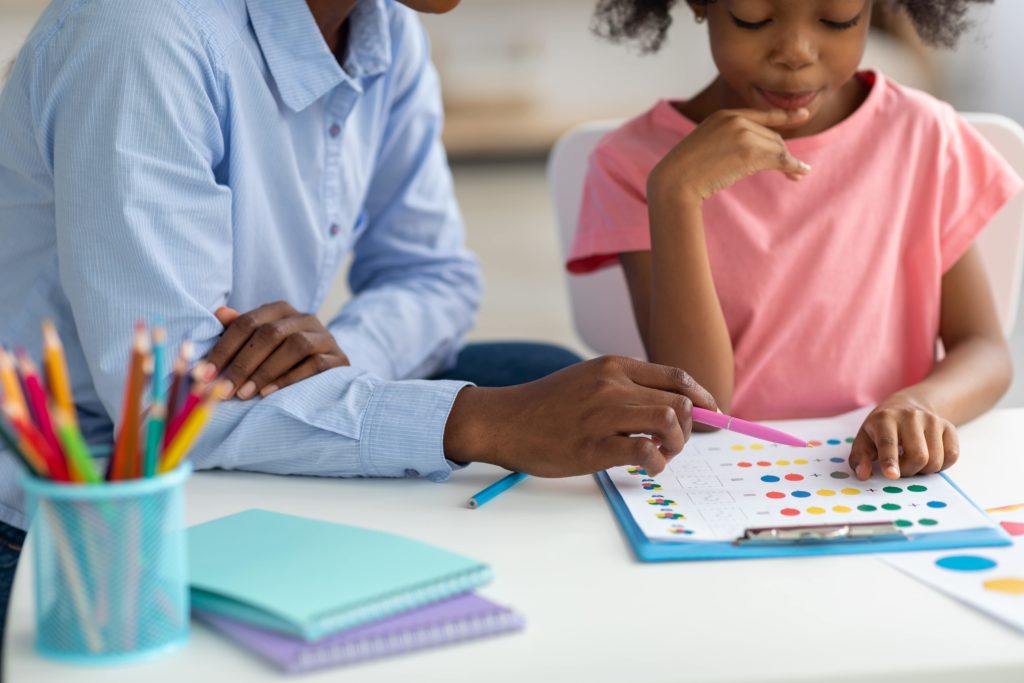The first week of May is Mental Health Week so we sat down with our psychologist, Bobbi Jo Gaetz to outline ways in which families can help children develop emotional literacy in their children.
By: Bobbi Jo Gaetz, B.Ed, M.Ed, R.Psych
Mental health research shows that emotional intelligence, also known as “emotional literacy,” is very important to a child’s development because an individual with strong emotional literacy skills has the ability to better express their emotions in a healthy way and, therefore, have healthy relationships with themselves and others.

What Is Emotional Literacy?
Simply put, emotional literacy is being able to understand and express one’s feelings. It is an important step in being able to be empathetic to others. As well, emotional literacy is associated with children who are emotionally well-adjusted, popular, outgoing, well-liked, nicer, happier, and resilient.
However, developing emotional literacy is more difficult in our society than ever before. Why? We are living in a digital world that has become even more digital since the Covid-19 pandemic caused many school closures and social isolation. The development of emotional literacy relies on interacting with others in person, face-to-face. We are also busier and more distracted as adults as we stare at our phones, televisions, and computers more than ever before, meaning less face-to-face interactions and responsiveness to those around us, including our children.
In the book Unselfie, Michele Borba suggests that girls tend to be more attuned to the emotions of others because society expects boys not to show their emotions as readily. Without sharing their emotions with others, boys have fewer conversations with adults about feelings in general. A child’s temperament and developmental level can also play a role in how easily they can recognize and identify emotions.
How to Develop Emotional Literacy in Children
So, if children are happier and nicer when they have stronger emotional literacy (including better long-term mental health), how can we help them develop it? Similar to how we help children develop skills to regulate their own emotions, it turns out. Here are 5 ways to help your child develop emotional literacy.
- Build Emotional Vocabulary: Build an emotional vocabulary by labeling your child’s feelings. No matter if your child is experiencing feelings of happiness or sadness, anger or frustration, or any other range of emotions, label them and help your child match the words with what they’re feeling. For example, you could say, “I can tell you are very excited about going to visit your friend today!” Or, “Boy, it sure looks like you are really angry! Are you this angry (use your arms/hands to show a size), or THIS angry (bigger)?” Children who don’t always respond positively to you labelling their emotions may engage better when they feel the need to tell you how BIG their feeling is.
- Don’t Judge Feelings: One important note about labeling your child’s feelings is to try not to judge their feelings (ie., inappropriate/appropriate, too big/small, etc.) “You shouldn’t feel that way” or “There’s no reason to be so upset” are some examples. This invalidates what they are feeling, and they end up being confused about emotions and begin to hide them rather than learning how to express them in a healthy way.
- Show, Don’t Tell: Children need support to learn to express and cope with their emotions in a healthy way. This means to first model the behaviour you want from your child. If the adults around a child yell when they are upset, for example, then this is what the child learns. When a child is upset, remain calm and teach them alternative ways to cope, such as deep breaths, positive affirmations, using a calming kit/box, and then guide them through problem-solving steps if needed. Use the child’s behaviour when they are having big emotions as a signal of what skills they need to learn (ie., learning how to say what they are feeling using “I” messages rather than yelling, waiting their turn, handling losing, etc.).
- Display Empathy: In order to build empathy in children, modeling is, once again, very helpful. When adults treat children with empathy, this shows them directly what it looks and feels like to be empathetic. When we label their feelings and do not judge them, we are showing them empathy. We can also show that we understand what they may be feeling by validating their emotions and sharing our own. Saying something along the lines of, “I feel upset sometimes when I don’t get my way, too,” is a great way to help children understand that their feelings are normal.
- Provide Learning Resources: It is important to note that children first learn to recognize emotions in others before they are able to recognize their own. We can teach children about feelings by reading books about them, watching programs or videos about emotions, and pointing them out. “How do you think Rocky is feeling right now? What is his face telling you?” As you work to develop your child’s emotional literacy, it is important to also help them understand that others may not feel the say way they do. This is beneficial for your child to learn other people’s perspectives and for the development of empathy.
Children’s Books to Help Develop Emotional Literacy
- My Many Colored Days – by Dr. Seuss (I even used this with junior high school students in a lesson, even though it is a picture book.)
- The Color Monster – by Anna Lienas
- In My Heart: A Book of Feelings – by Jo Witek
- The Boy with Big, Big Feelings – by Britney Winn Lee
- The Way I Feel – by Janan Cain
- A Little Spot of… book series by Diane Alber
- A Little Spot of Confidence, A Little Spot of Patience, A Little Spot of Anger, A Little Calm Spot, etc.
Stay in the know and check us out on social media! Follow BrightPath on Facebook and Instagram for a variety of fun activities and daily inspiration.
About the Author
Bobbi Jo Gaetz, B.Ed, M.Ed, R.Psych has worked in the field of children and adolescents for 25+ years. As a psychologist, Bobbi Jo has worked in a variety of clinical, school, and treatment settings providing assessment, consultation, and intervention for children and youth. She supports children with behavioural, emotional, and/or social difficulties, including children with diagnoses such as Autism Spectrum Disorder, ADHD, and learning disabilities. Currently, Bobbi Jo works in private practice as well as within the mental health system for children and youth.








